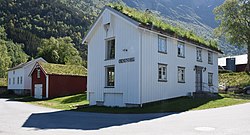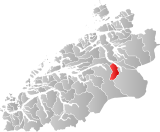Øksendal
Øksendal Municipality
Øksendal herred | |
|---|---|
| Øksendalen herred (historic name) | |
 The municipal council of Øksendal used to assemble in this house at Øksendalsøra. | |
 Møre og Romsdal within Norway | |
 Øksendal within Møre og Romsdal | |
| Coordinates: 62°40′32″N 08°23′57″E / 62.67556°N 8.39917°E | |
| Country | Norway |
| County | Møre og Romsdal |
| District | Nordmøre |
| Established | 1854 |
| • Preceded by | Sunndal Municipality |
| Disestablished | 1 Jan 1960 |
| • Succeeded by | Sunndal Municipality |
| Administrative centre | Øksendalsøra |
| Area (upon dissolution) | |
• Total | 223 km2 (86 sq mi) |
| Population (1960) | |
• Total | 497 |
| • Density | 2.2/km2 (5.8/sq mi) |
| Time zone | UTC+01:00 (CET) |
| • Summer (DST) | UTC+02:00 (CEST) |
| ISO 3166 code | NO-1561[1] |
Øksendal is a former municipality in Møre og Romsdal county, Norway. The 223-square-kilometre (86 sq mi) municipality existed from 1854 until its dissolution in 1960. It had one of the smallest municipal populations in Norway. It was located in the northern part of the present-day municipality of Sunndal, along the Sunndalsfjorden. It included the coastal area along the fjord as well as the whole Øksendalen valley. The administrative centre of the municipality was the village of Øksendalsøra, where Øksendal Church is also located.[2]
History
[edit]In 1854, the parish of Øksendal was separated from the large municipality of Sunndal to establish the new municipality of Øksendal. Initially, Øksendal had a population of 1,291. On 1 January 1899, the northern part of the municipality, located on the northern side of the Sunndalsfjorden, (population: 462) was separated to become the new municipality of Ulvundeid. This left Øksendal with 654 inhabitants. During the 1960s, there were many municipal mergers across Norway due to the work of the Schei Committee. On 1 January 1960, Øksendal Municipality (population: 497) was merged with Ålvundeid Municipality (population: 513) and Sunndal Municipality (population: 5,851) to form a new, larger Sunndal Municipality.[3]
Name
[edit]The municipality (originally the parish) is named after the Øksendalen valley (Old Norse: Usmudalr). The first element is usma which is the name for the river that runs through the valley. The meaning of the name is unknown. The last element is dalr which means "valley" or "dale".[4] Historically, the name of the municipality was spelled Øksendalen. On 3 November 1917, a royal resolution changed the spelling of the name of the municipality to Øksendal, removing the definite form ending -en.[5]
Government
[edit]While it existed, this municipality was responsible for primary education (through 10th grade), outpatient health services, senior citizen services, unemployment, social services, zoning, economic development, and municipal roads. During its existence, this municipality was governed by a municipal council of directly elected representatives. The mayor was indirectly elected by a vote of the municipal council.[6]
Municipal council
[edit]The municipal council (Herredsstyre) of Øksendal was made up of 13 representatives that were elected to four year terms. The party breakdown of the final municipal council was as follows:
| Party name (in Norwegian) | Number of representatives | |
|---|---|---|
| Labour Party (Arbeiderpartiet) | 5 | |
| Joint List(s) of Non-Socialist Parties (Borgerlige Felleslister) | 8 | |
| Total number of members: | 13 | |
| Party name (in Norwegian) | Number of representatives | |
|---|---|---|
| Labour Party (Arbeiderpartiet) | 5 | |
| Joint List(s) of Non-Socialist Parties (Borgerlige Felleslister) | 7 | |
| Total number of members: | 12 | |
| Party name (in Norwegian) | Number of representatives | |
|---|---|---|
| Labour Party (Arbeiderpartiet) | 5 | |
| Joint List(s) of Non-Socialist Parties (Borgerlige Felleslister) | 7 | |
| Total number of members: | 12 | |
| Party name (in Norwegian) | Number of representatives | |
|---|---|---|
| Labour Party (Arbeiderpartiet) | 5 | |
| Joint List(s) of Non-Socialist Parties (Borgerlige Felleslister) | 7 | |
| Total number of members: | 12 | |
| Party name (in Norwegian) | Number of representatives | |
|---|---|---|
| Local List(s) (Lokale lister) | 12 | |
| Total number of members: | 12 | |
| Note: Due to the German occupation of Norway during World War II, no elections were held for new municipal councils until after the war ended in 1945. | ||
See also
[edit]References
[edit]- ^ Bolstad, Erik; Thorsnæs, Geir, eds. (26 January 2023). "Kommunenummer". Store norske leksikon (in Norwegian). Kunnskapsforlaget.
- ^ Store norske leksikon. "Øksendal. – kommune" (in Norwegian). Retrieved 5 December 2010.
- ^ Jukvam, Dag (1999). Historisk oversikt over endringer i kommune- og fylkesinndelingen (PDF) (in Norwegian). Statistisk sentralbyrå. ISBN 9788253746845.
- ^ Rygh, Oluf (1908). Norske gaardnavne: Romsdals amt (in Norwegian) (13 ed.). Kristiania, Norge: W. C. Fabritius & sønners bogtrikkeri. p. 382.
- ^ "Norsk Lovtidende. 2den Afdeling. 1917. Samling af Love, Resolutioner m.m". Norsk Lovtidend (in Norwegian). Kristiania, Norge: Grøndahl og Søns Boktrykkeri: 1057–1065. 1917.
- ^ Hansen, Tore; Vabo, Signy Irene, eds. (20 September 2022). "kommunestyre". Store norske leksikon (in Norwegian). Kunnskapsforlaget. Retrieved 1 January 2023.
- ^ "Kommunevalgene og Ordførervalgene 1955" (PDF) (in Norwegian). Oslo: Statistisk sentralbyrå. 1957. Retrieved 24 April 2020.
- ^ "Kommunevalgene og Ordførervalgene 1951" (PDF) (in Norwegian). Oslo: Statistisk sentralbyrå. 1952. Retrieved 24 April 2020.
- ^ "Kommunevalgene og Ordførervalgene 1947" (PDF) (in Norwegian). Oslo: Statistisk sentralbyrå. 1948. Retrieved 24 April 2020.
- ^ "Kommunevalgene og Ordførervalgene 1945" (PDF) (in Norwegian). Oslo: Statistisk sentralbyrå. 1947. Retrieved 24 April 2020.
- ^ "Kommunevalgene og Ordførervalgene 1937" (PDF) (in Norwegian). Oslo: Statistisk sentralbyrå. 1938. Retrieved 24 April 2020.

